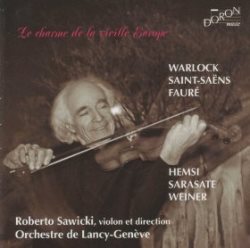|

|
Le Charme de la vieille Europe
Peter WARLOCK (1894-1930)
Capriol Suite (1926) [11:18]
Camille SAINT-SAËNS (1835-1921)
Le Déluge: Prelude, Op.45 (1875) [7:13]
Introduction and Rondo Capriccioso, Op.28 (1863) [9:26]
Gabriel FAURÉ (1845-1924)
Shylock: Nocturne, Op.57 (1889) [2:46]
Berceuse, Op.16 (1879) [4:02]
Alberto HEMSI (1898-1976)
Vecchia canzone del ghetto, Op.15 No.1 (c.1935) arr. Zoltan Kacsoh [2:26]
Danza poppolare ebraica, Op.15 No.2 (c.1935) arr. Zoltan Kacsoh [2:53]
TRADITIONAL
Latschi Dai [8:18]
Pablo de SARASATE (1844-1908)
Zigeunerweisen, Op.20 (1878) [8:18]
Leó WEINER (1885-1960)
Divertimento No.1 Op.20 (1934) [11:23]
Orchestre de Lancy-Genève/Roberto Sawicki (violin)
rec. live, August 1994, Eglise de Pornic, France (Warlock, Saint-Saëns): December 2010 and October 2011 Eglise Notre Dame des Graces, Lancy, Switzerland (remainder)
DORON DRC5038 [62:49]
‘The Charm of Old Europe’ is the title of this album, which gives it more than a whiff of thatched cottages, merry sing-alongs in taverns and ruddy-faced peasants cobbling away in rustic idylls. I’m not sure how much this quite reflects the contents of the CD, but admittedly Peter Warlock liked a drink and his Capriol Suite evokes times past. In a programme of live material it’s inevitable that things go astray just now and then, but clearly solo violinist and conductor Roberto Sawicki is having no truck with any notions of stiff upper lip. There is some very saucy phrasing in the Basse dance, at which Neville Dilkes would doubtless have looked and listened askance, but the central movements are disappointingly tepid and the Pieds-en-l’air could have been more affectionate and, in truth, subtle.
The quietly sepulchral start to Saint-Saëns’s La Déluge Prelude gives way to lighter textures, and for the second piece by the composer Sawicki takes up his fiddle and enjoys some succulent little expressive devices to bring a well-worn piece to life. In this respect he is not helped by an acoustic that is both recessed and boomy, or by the chamber-sized nature of the orchestra which tends to stint on the excitement value. Zigeunerweisen is also a good, if predictable vehicle for his violin. The relevance of the charms, or otherwise, of Old Europe aren’t immediately apparent in the Fauré brace, pleasing though it always is to hear anything from Shylock and the Berceuse, where the recording venue has changed – and we have moved forward from 1994 to 2010. The recording is now more focused and the solo violin more logically centre-stage. Alberto Hemsi’s Jewish music is both brief and vibrant, and something of an exercise in archaism, but Weiner’s Divertimento No.1, which mines Hungarian dance music, is better known and more extensive. The sound here is a touch too recessed, and that somewhat blunts the impact of the zesty music.
Enjoyable though much of this disc is, it’s also something of a curiosity.
Jonathan Woolf
 |
 |
|



 All Nimbus reviews
All Nimbus reviews








